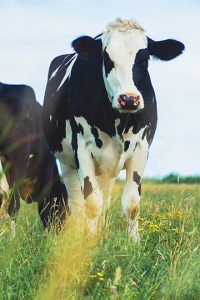 There’s a lot of reasons to choose organic foods, particularly organic animal products. One of those reasons is the concern over hormones in food. It’s obvious that there’s a potential for problems if you eat fruit or vegetables laden with pesticides, but far less obvious if you eat animal products that come from animals that are fed hormones. The popular train of thought is that you eat what the animals ate when you consume those products and it’s better to eat food that comes from animals fed more naturally.
There’s a lot of reasons to choose organic foods, particularly organic animal products. One of those reasons is the concern over hormones in food. It’s obvious that there’s a potential for problems if you eat fruit or vegetables laden with pesticides, but far less obvious if you eat animal products that come from animals that are fed hormones. The popular train of thought is that you eat what the animals ate when you consume those products and it’s better to eat food that comes from animals fed more naturally.
Farming is no longer a mom-and-pop industry.
At one time, there were thousands of farmers contributing small amounts to the food supply. Many people even grew their own food. Today farming is a multimillion dollar industry and uses techniques to make it more profitable, whether it’s increasing the output per acre for grain and giving animals hormones and antibiotics to make them grow faster or have more milk or eggs. One of those hormones is rBGH— recombinant bovine growth hormones. It increases milk production.
Does rBGH cause problems in people who drink the milk?
The hormone, rBGH, doesn’t transfer to humans, but cows given it have more of a second hormone insulin-like growth factor—IGF—in their milk, which may have an affect. IGF mimics human growth hormone. Increased amounts are linked with increased risk factors for breast, prostate and other types of cancer. Milk from cows that were given rBGH have ten times more IGF than milk from cows not receiving it. While that sounds ominous, it’s really not, since the amount the body makes daily is so much more that it’s insignificant.
Other hormones and genetically modified feed may affect your health.
There’s really no clear answer whether the human body can absorb the hormones progesterone, estrogen or testosterone that animals are given to boost growth. They receive both natural steroid hormones and synthetic ones to increase growth and shorten the growth cycle. That increase in growth may lower the cost of the meat, but does it affect the public? There’s no evidence yet that eating eggs, meat or drinking the milk effects on the body or whether it’s even possible to absorb these hormones. One study noted that the increase is insignificant in adults, but may affect children differently and be responsible for increasing the onset of puberty by seven months.
- One side effect of the extra hormones given to milk cows is an increase in udder infections. That means cows are given antibiotics for the infections. It could increase the risk of antibiotic resistant bacteria.
- While studies often give varying results, one study showed that food containing IGF-1 may increase the risk for a multitude of diseases, one of which is diabetes.
- Besides lowering your risk for exposure to hormones, using animal products from free-range and pasture fed animals has benefits. Milk and milk products from pasture fed cows have higher CLA—conjugated linoleic acid—which is heart healthy, lower omega-6 and more omega-3.
- There’s no direct conclusion on whether hormones and antibiotics in food can affect you or the effects on young children. If you’re concerned, opt for organic, free-range, hormone and antibiotic-free options.
For more information, contact us today at LIV Fitness
